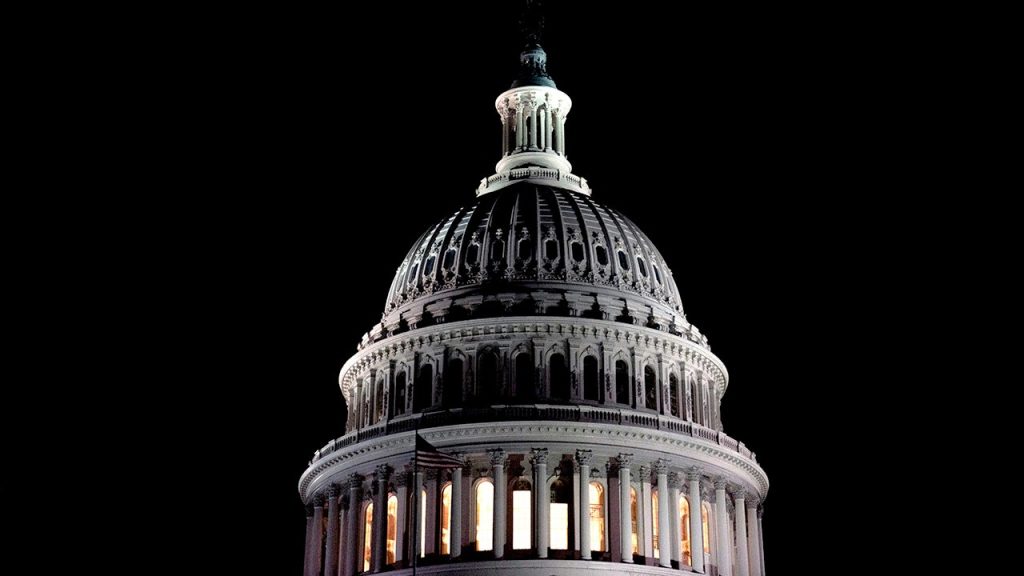The political landscape in Washington is currently a maelstrom of uncertainty and tension as a potential government shutdown looms. House Speaker Mike Johnson’s proposed interim spending bill, a hefty 1,547-page document designed to fund the government through March 14, has effectively been torpedoed, largely due to a confluence of opposition from unexpected corners. President-elect Trump, Vice President-elect Vance, and notably, Elon Musk, publicly denounced the package, igniting a firestorm of grassroots conservative resistance that ultimately forced Johnson to withdraw the bill from consideration. This unexpected turn of events has left House Republican leaders scrambling for an alternative solution, with the clock ticking down to a Friday midnight deadline.
The spending bill’s downfall can be attributed to a combination of factors. Its sheer size and the inclusion of numerous add-ons, likened to ornaments on a Christmas tree, drew criticism for excessive spending. Conservatives, anticipating a different approach from Johnson, felt betrayed by the bill’s composition. Furthermore, President-elect Trump’s late intervention, demanding a debt ceiling increase alongside the spending measure, further complicated matters. This demand resurrected a contentious issue that the incoming administration had hoped to postpone, potentially derailing their legislative agenda and unsettling financial markets.
Johnson’s abrupt reversal on the spending bill, despite his earlier enthusiastic endorsement, reveals several significant dynamics at play. It highlights the considerable influence that President-elect Trump wields even before officially taking office, foreshadowing potential challenges for Johnson’s speakership. The incident suggests that Johnson may find himself frequently beholden to the new president’s whims, potentially undermining his authority and autonomy. The Speaker’s decision was primarily driven by the widespread discontent among his Republican colleagues, amplified by the public pronouncements of Musk and the President-elect.
The looming January 3 Speaker vote adds another layer of complexity to the situation. Johnson needs to secure 218 votes to retain his speakership, and the fallout from the failed spending bill has undoubtedly jeopardized his chances. The memory of the protracted Speaker election in January 2023, which took five days and multiple rounds of voting to finally elect Kevin McCarthy, serves as a stark reminder of the potential for chaos and uncertainty. Johnson’s attempt to bolster his support by including emergency agricultural spending in the bill proved insufficient, leaving him scrambling for a new strategy to maintain his position.
Ironically, Johnson’s primary aim was to avoid pre-Christmas drama surrounding the spending bill, but his actions inadvertently triggered a crisis reminiscent of the 2012 fiscal cliff and the 2014 government shutdown threat. The central question now revolves around Johnson’s next move. A “clean” continuing resolution (CR) to fund the government without any additional provisions is one possibility. Another option is a bill that simply extends current funding levels coupled with disaster aid. Including a debt ceiling suspension, as requested by President-elect Trump, adds another layer of complexity. The overarching question is whether any proposal can garner sufficient support to pass, especially without relying on Democratic votes.
Johnson faces a formidable challenge in uniting his caucus. A faction of hardline conservatives opposes any CR whatsoever, and many also reject a debt ceiling increase. Even if a new bill emerges, the insistence by some conservatives on a three-day review period could trigger a government shutdown automatically. With the deadline looming, finding a solution requires a significant act of political maneuvering. President-elect Trump’s intervention echoes a similar tactic he employed in December 2019, which resulted in the longest government shutdown in history. In that instance, a bipartisan deal to avert a Christmas shutdown, seemingly agreed upon by Senate leaders and appropriators, was abruptly scuttled by Trump’s last-minute opposition, leading to a month-long government closure. The current situation bears an uncanny resemblance to that prior crisis, raising concerns about a potential repeat performance.

